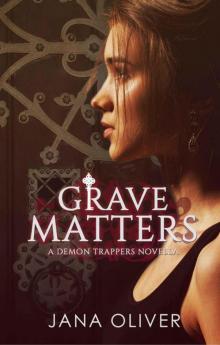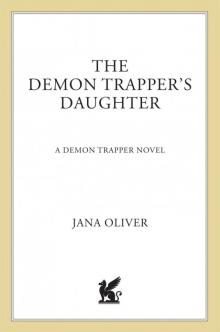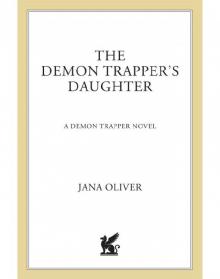- Home
- Jana Oliver
Madman's Dance (Time Rovers) Page 48
Madman's Dance (Time Rovers) Read online
Page 48
“That’s a lot of messing around,” she said, astounded. “I thought that was a no-no.”
“It used to be, but now we seem to be involved in the time stream more than ever. I can’t say I like that.”
“We?”
Anderson shook his head. “I’ve told you too much as it is.”
That was fair. “What about Defoe?”
“His mind will never be right again. He must stay in our time. We’ll keep him safe.”
“Theo isn’t going to like that,” she protested.
“We know, but there’s no other choice. We have no idea why our counterparts want him so badly. Until we do, he’s at risk.”
Farther downstream, a boat departed from a landing, heading to the far shore.
She had to ask the question. “Is this how my timeline was supposed to fall out?”
Anderson shook his head. “Much like the doctor and the sergeant, your life is now on a new thread.”
“It was Chris’ death, wasn’t it? Things felt wrong from that point on.”
Anderson nodded. “His accidental death triggered a time swell that rippled through the stream.”
And brought Theo and me together.
She straightened up. “Do me a favor—make sure Defoe attends Adelaide Winston’s funeral.”
The Future opened his mouth in protest, but she waved him off. “That’s not negotiable, Mr. Anderson. That’s what you owe me.”
There was a deep sigh. “I will see what I can do.”
“Thank you.” Cynda relaxed, gazing out at the Thames. “Why the Armageddon scenario?”
“It was the opening they needed to replace some of the key figures in Victorian politics with shape-shifters. It would have been easy during the upheaval. There are some who believe the Transitives should reveal themselves before 2062. That’s a mistake, of course, because it significantly alters history.”
“So does London burning like a Yule log. Why not let the shifters come out?” she insisted. “It’s going to happen anyway.”
Anderson shook his head. “The outcome of the Second World War would not have been to our advantage. They play a key part in overthrowing the Axis powers. If they are revealed now, that would not happen. Changes would ripple upstream.” Anderson paused, pitching his voice lower. “It was not a decision we made lightly.”
“What about the Null Mems?”
“Those are your problem. We have enough of our own.”
“Thanks,” she muttered.
“What matters to us is that our foes have lost this round. There will be other plots, though I suspect not in ’88. This patch of time is significantly more stable now.”
“Lots of good people got hurt,” she said.
“Far too many.”
Then Anderson was gone.
She leaned against the bridge railing, staring down into the water below. Copeland’s new home.
So where will you come to rest?
Chapter 23
Sunday, 11 November, 1888
Sandringham Estate
They alighted from the carriage, discomfort translating into organized grooming: shooting of cuffs, straightening of collars, smoothing of hair.
As they waited, Chief Inspector Fisher seemed to be off in his own thoughts. Inspector Ramsey stood next to him, mute, clearly uncomfortable. Keats kept pulling on his collar. Even Alastair was struggling with his nerves. One did not meet the future King of England every day.
“Posh digs,” Keats observed.
Ramsey craned his neck upward. “I wonder how many sweeps they need to clean all those chimneys.”
“I could retire here,” Fisher said, a bit louder. “I wonder if they’d mind if I just took up a few rooms. Probably wouldn’t miss them.”
More tentative smiles.
“This way, sirs,” a servant announced, guiding them forward with gloved hands and a noiseless tread.
They found themselves in a room with an intricately carved minstrel’s gallery. It promised grand balls and the sound of gay music.
“Well, gentlemen, our moment has arrived,” Fisher announced quietly.
A door opened to admit His Royal Highness, the Prince of Wales. Behind him was a tall, gaunt young man who wore a high collar. As he took his place near the prince, Alastair realized it was the Duke of Clarence, second in line to the throne. The young man’s disinterested expression immediately caught his notice.
“Your Royal Highnesses,” Fisher said, bowing. All the others followed suit.
“Ah, you must be Chief Inspector Fisher,” the Prince of Wales replied.
“Yes, Your Royal Highness. With your permission, I would like to present Inspector Ramsey and former Detective-Sergeant Keats. They were instrumental in preventing the anarchist’s attack.”
Alastair felt a pang of regret that Jacynda and her Mr. Morrisey weren’t here. They’d been as much a part of the effort as the rest of them.
“Good day, gentlemen,” the prince replied.
“Your Royal Highness, this is Dr. Alastair Montrose. He assisted us in our efforts. If I may say, his efforts are proving a boon to Scotland Yard.”
“I have heard of you, Doctor,” the prince replied. “You assist another physician…Bishop, I believe his name is.”
“Yes, Your Royal Highness. I am most honored to work with such a learned man…and with Scotland Yard.”
“I read your testimony in the newspaper, how you determined that Mr. Keats here was not of sufficient stature to have murdered that woman.” The prince nodded his approval. “Stellar work, I must say. New ways are upon us, gentlemen. Don’t you agree, Eddy?”
His son blinked and then nodded. “Indeed.” He seemed bored by the conversation.
“Our enemies are very clever,” the prince continued. “This whole affair speaks of dangers the like of which we can only imagine.” He eyed Fisher. “I understand you are taking retirement, Chief Inspector. Is there no way you can be persuaded to remain at your post?”
“I am honored, Your Royal Highness, but I am ready to hand off the reins and, frankly, I believe Home Office is ready for my departure. Inspector Ramsey will be assuming my position. He will do a fine job.”
Ramsey shifted his feet, uncomfortable with the praise.
“I am sure he shall.” The prince turned toward Keats. “And you, sir, to what will you turn your hand now that you are no longer with the Yard?”
“I have been encouraged to become an agent of private enquiry, Your Royal Highness. In that way, my training will not go to waste.”
“Excellent. Miss Lassiter speaks highly of you, sir, and your staunch spirit during the trial bears strong witness to your honor. I shall keep you in mind, lest we have an issue of a private nature that would need such talent as yours.”
Keats swallowed in surprise.
At a gesture from the Prince of Wales, a footman bustled up.
“Gentlemen, you have the gratitude of the Queen and the country for your unfailing service. God knows how many would have perished if you had not risen to the call in this time of need.” He solemnly handed each a box and an envelope. “A token of our appreciation.”
They bowed in unison.
“Might you have time for a whiskey?” the prince asked.
“Well, certainly, Your Royal Highness,” Fisher said, astonished at the offer. “We would be very honored.”
“Then come along. I just received some fine cigars in honor of my birthday. Let’s break them out, and you can tell us about this ordeal. It sounds most hellish.”
An hour later, warmed by the excellent spirits, the quartet loosened their collars as the carriage rattled toward the train station.
“It has been a week, I must say,” Keats observed. “I’m nearly hanged, then almost blown to bits, and then I get to sip spirits with the next monarch.”
Ramsey pulled a frown. “Not to speak ill, but I don’t think the Duke of Clarence is the sharpest hatchet in the woodshed.”
“I have to agree
,” Fisher allowed. “He does not possess his father’s nor his grandmother’s intelligence. Eddy is, in fact, quite dull. Collars and Cuffs will not be an excellent ruler.”
“We get the monarchy we deserve,” Keats chided. “If the line had continued through the Scots—”
“Keats!” Fisher scolded.
“It’s the truth, sir. The Germans are, well—”
“Not English,” Ramsey finished.
Fisher chortled. “I think that’s the first time I’ve ever seen both of you agree on a subject.”
“Don’t worry, it won’t last,” Keats assured him. “Not once I begin accepting cases the Yard can’t solve.”
Ramsey eyed him. “Just mind you don’t get in our way, mister.”
“Oh, I’m sure I shall on more than one occasion,” Keats chirped brightly, “if nothing more than to get up your nose, Chief Inspector. How else will I amuse myself?”
“Ah, good, that’s more like it,” Fisher exclaimed. “I had thought the world was coming to an end.” He gave Alastair a concerned look. “You’re very quiet, Doctor.”
Alastair’s eyes caught Keats’. “A bit too much whiskey, I think.”
Once they were alone, and ensconced in Alastair’s parlor, Keats broached the subject. “So what’s bothering you?” he asked, polishing his medal on a sleeve for the second time, obviously proud of his achievement. “You were pretty quiet on the return journey.”
Instead of answering, Alastair slit open his envelope. “Seventy-five quid. Very nice.”
Keats checked his. “The same. That’ll help with expenses.” He put away the check. “What was going on at Sandringham?” he pressed.
“There was one of us en mirage with the prince.”
Keats’ eyes snapped up. “Which one?”
“I’m not sure. Could have been one of the servants for all I know.”
Keats slumped back in his chair. “A shifter in the royal household. Where else are they?”
“I would expect us to be everywhere,” Alastair said.
“As you say.”
“I’m curious—where is Flaherty now? Has he gone back to Ireland?”
“He’s out of the country. Left rather suddenly,” Keats replied. “Clancy Moran, as well. They seem to have come into a bit of money and decided to start over in America.”
Alastair eyed his friend. “Did you have a hand in that?”
“Yes.” Keats smiled. “Aiding and abetting anarchists. How far the mighty have fallen.”
The doctor nodded his approval. “Well done, my friend.”
Keats sighed. “Despite everything, Flaherty was still going to blow up the Crystal Palace. He’d heard about that Irish girl who was murdered in Whitechapel, and thought it was his daughter. He believed his enemies had gotten their revenge.”
“What kept him from doing it?”
“Someone told him it was Mary Kelly who died. He said he knew her, that they’d been together a couple of times.”
Alastair shook his head. “I don’t know if I ever met her. I might have, at the clinic. I saw so many.”
Keats sighed. “I liked Mary. I’d give her money every now and then. She was a nice sort. I didn’t know she’d seen me that night in Whitechapel.”
“What?” Alastair asked, puzzled.
“Oh, sorry, I thought you knew that. She came forward, after the trial,” Keats explained. “According to Kingsbury, she made her statement right before the case was reviewed by the Lord Chief Justice.”
“That was risky for her.”
Keats shook his head. “The Irish wouldn’t hurt her. Flaherty spread the word that she wasn’t to be harmed.”
“Then it was the Ripper,” Alastair replied. “I had hoped we’d see no more of him.”
“I’m not so sure it was his handiwork,” Keats said.
Alastair cocked his head. “Who then?”
“I know this is going to sound outlandish, but I think her murder was retribution, a message, as it were. You cross us, we’ll destroy you. They couldn’t get to Paddy, so they came after her.”
“Good Lord,” Alastair exclaimed. “What a horrifying thought.”
“Perhaps someday, my friend, we’ll know the truth of all of this,” Keats said, rousing himself from his melancholy. “But first, I must find new lodgings. My dear landlady is pleased at my acquittal, but uncomfortable with my presence. I can’t blame her what with all the notoriety. Any suggestions for my next abode?”
“Well, Annabelle’s Boarding House is quite reasonable and the food is hearty, but you are accustomed to more space than she offers.” Alastair thought for a moment, then snapped his fingers. “I have the perfect place.”
“Where? Is it near here?” Keats asked.
“Very,” Alastair replied, beaming. He pointed upward. “It’s the room you’re in right now. You can pay me what you feel it is worth. Mrs. Butler will see your laundry is done and cook your meals as needed.”
Keats shook his head immediately. “No need to trouble yourself. I can find another place.”
“I’d like the company, my friend, and the income will help as well.”
“I see.” Keats puzzled on the offer for a few moments. “It would be quite pleasant. I’ve missed our talks.”
“Well then, why not?”
“We’d be like Holmes and Watson,” Keats said impishly.
Alastair frowned. “I am no Watson, and you are most certainly not Sherlock Holmes.”
“Why not?” Keats challenged. “I just helped solve a most baffling case.”
“You’re smarter than Holmes, for one.”
“That remains to be seen. Yes, I shall accept your offer. If you don’t mind, I shall move in tomorrow afternoon, if that will suit.”
“That will be fine. Mrs. Butler will help you as I shall be out. Evelyn has invited me for tea.”
Keats leaned forward. “How’s that going?”
“Slowly. We have a lot unsaid between us.”
“So don’t say it. Just kiss her,” Keats urged. “That always does the trick.”
“You’re sounding more like your old self, my friend.”
“Maybe.” Rising, Keats tucked away the medal and the check in a trouser pocket. “I just realized—after I move, I shall have to find a case. I’ve never had to do that before. They just came to me.”
“I’m sure you’ll be kept busy.”
“I hope so. I’m fond of eating regularly.” Keats awkwardly stepped forward and offered his hand. “I owe you so much, my friend. Not everyone would want to be associated with someone once accused of murder.”
Alastair waited for him to make the connection.
Keats colored in embarrassment. “Oh, I’ve put my foot it in now. We are birds of a feather, are we not?”
Alastair rose and shook his hand in a firm grasp. “I cannot think of a better friend than you, Jonathon.”
“Well, either way, we’re stuck with each other,” Keats said. As he marched down the hallway, he called out jauntily, “Good evening, Watson!”
“Go away, Keats.”
~••~••~••~
Monday, 12 November, 1888
Scotland Yard
Fisher looked up as Ramsey entered the office. “Ah, there you are, Chief Inspector. Congratulations, Martin. I hear it’s official.”
“Thank you, sir.” Ramsey shook his head. “I kept thinking you’d change your mind. Not that it would have troubled me if you had.”
“No. I’m ready to go. I may have always been partial to Keats, but I knew in my heart you had the potential for this job. These last few weeks you withstood immense pressure and conducted one of the most thorough investigations of your career. You are worthy of becoming Chief Inspector, Martin. I have no doubt of it.”
Ramsey looked away for a moment and then back, his eyes glassy. “It was a damned nightmare.”
“One of the darkest I’ve ever seen,” Fisher agreed. “We nearly hanged an innocent man just to keep a sybar
itic few safe from public condemnation. That’s not why I became a copper.”
“What will you do, sir?” Ramsey asked.
“Jane and I are moving to Brighton, near her family. I fancy a house near the water. It’s idyllic there. No Home Office toadies or police commissioner watching my every move.”
“Your good wife will be,” Ramsey quipped.
Fisher chuckled. “Yes, she has already said that I must acquire a hobby, a pursuit that keeps me occupied. She is accustomed to running her own household, and would not appreciate a retired chief inspector’s interference.”
Ramsey quirked a bushy eyebrow. “So how long will it be before they start pulling my chain?”
“Not long. It’s been embarrassing for them, what with Warren’s resignation and the prince putting pressure on them about Keats. You’ll have a lot on your plate.”
“Do you think Hulme killed himself?”
Fisher shook his head. “No, but that’s one avenue of investigation you should not pursue.”
“I don’t like the notion that someone can murder a copper and get away with it.”
“Or frame one, for that matter.”
Ramsey sighed. “Where will I find someone to take my place when the time comes?”
Fisher smiled. “That’s your problem, Chief Inspector, not mine. Not anymore.”
Ramsey offered his large hand and Fisher shook it earnestly.
“Watch your back, Martin. If you need advice, contact me. Visit me sometime during the next week. We’ll dine together. There’s a private conversation we must have. You don’t know all the players in this game, but I’ll tell you what I know. Just not here.”
“Does it have something to do with those coins?”
“Those remain a mystery.”
Ramsey nodded. “What about Keats?”
“I suspect you and he will bump heads soon enough.”
“That I don’t doubt,” the new chief inspector replied.

 Mind Games
Mind Games Grave Matters
Grave Matters The Demon Trappers 3: Forgiven
The Demon Trappers 3: Forgiven Forbidden
Forbidden Forsaken
Forsaken Briar Rose
Briar Rose The Demon Trappers: Foretold
The Demon Trappers: Foretold Madman's Dance (Time Rovers)
Madman's Dance (Time Rovers) The Demon Trapper’s Daughter
The Demon Trapper’s Daughter Soul Thief-Demon Trappers 2
Soul Thief-Demon Trappers 2 Mind Games (Demon Trappers Book 5)
Mind Games (Demon Trappers Book 5) The Demon Trappers: Forgiven
The Demon Trappers: Forgiven